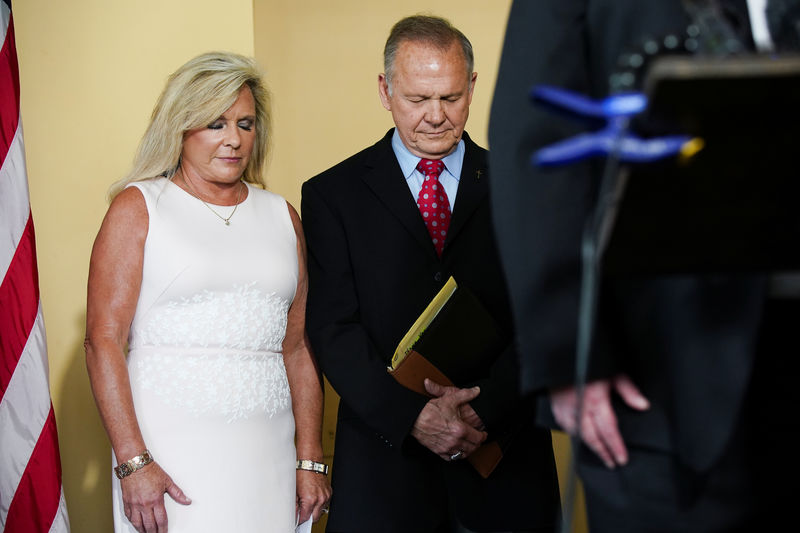By Joseph Ax
(Reuters) - Alabama Republican Roy Moore, whose 2017 U.S. Senate bid was derailed by allegations of decades-old sexual misconduct involving teenage girls, said on Thursday he would run again for the seat next year, defying his party's leadership.
The prospect of a rematch between Moore – a conservative former judge who cultivated controversy even before the salacious allegations against him – and U.S. Senator Doug Jones – widely considered the most vulnerable Democratic incumbent in 2020 – had gotten pushback from Republican Party leaders, including President Donald Trump.
"If Alabama does not elect a Republican to the Senate in 2020, many of the incredible gains that we have made during my Presidency may be lost," Trump wrote on Twitter last month. "Roy Moore cannot win, and the consequences will be devastating!"
Moore, 72, embraced his status as an outsider on Thursday, criticizing Republicans in Washington for trying to influence the Alabama race. He did not go after Trump, however, saying the president was pushed by party leadership to oppose him.
"Yes, I can win," Moore said. "Not only can I, they know I can. That's why there's such opposition."
Trump's son, Donald Trump Jr., tweeted that Moore was "going against my father and doing a disservice to all conservatives across the country in the process."
Democrats need a net gain of three seats in 2020 to win a majority in the 100-seat Senate, a task made easier if Jones can hang onto his seat in a state that Trump won in 2016 by nearly 30 percentage points.
Jones became the first Democratic senator from Alabama in decades when he narrowly won a special election after Moore was accused of pursuing sexual relationships with teenagers when he was in his 30s, including one girl as young as 14. He has denied all the allegations.
That race was to fill the seat held by Jeff Sessions, who became U.S. attorney general. The November 2020 election is for a full six-year term.
Several other Republicans, including former Auburn University head football coach Tommy Tuberville and U.S. Representative Bradley Byrne, have announced they will challenge Jones.
Republican leaders wasted little time making it clear they disfavored Moore's candidacy.
"We'll be opposing Roy Moore vigorously," Senate Majority Leader Mitch McConnell told reporters in Washington.
Moore still enjoys a base of support among evangelical voters. He was twice ousted as the state's chief judge – once for refusing a federal court order to remove a Ten Commandments monument from the judicial building and once for barring same-sex marriages despite the U.S. Supreme Court's ruling legalizing them.
In announcing his bid, Moore returned to the fiery rhetoric for which he is known, insisting his actions in both cases were justified and promising to put God at the center of his campaign.
In 2017, before the sexual misconduct allegations came to light, Moore won his party's nomination over establishment-backed Republican incumbent Luther Strange. A super PAC affiliated with McConnell spent millions of dollars boosting Strange's candidacy, and Trump appeared at a rally on Strange's behalf.
Some Republicans abandoned Moore after the accusations became public, and the party's Senate campaign arm cut ties with his campaign. But Trump endorsed Moore and sought to cast doubt on the veracity of the allegations against him.
Alabama's other U.S. senator, Republican Richard Shelby, told reporters on Thursday ahead of the news conference that he would not support a Moore candidacy.
A Moore campaign could prove to be a "headache" for Republicans running for office elsewhere, according to Zac McCrary, an Alabama-based Democratic pollster.

"Mitch McConnell and Republicans across the country don't want to spend the next year and a half answering questions about Roy Moore," McCrary said.